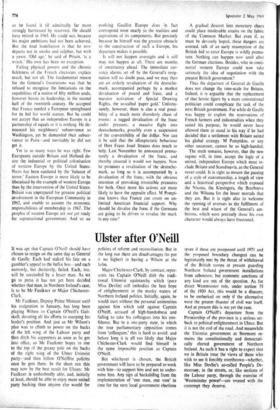Ulster after O'Neill
It was apt that Captain O'Neill should have chosen to resign on the same day as General de Gaulle. Each had staked his fate on a gambler's appeal to the ballot box—and each narrowly, but decisively, failed. Each, too, will be succeeded by a lesser man. As we go to press it has not yet been decided whether that man, in Northern Ireland's case. is to be Mr Faulkner or Major Chichester- Clark.
Mr Faulkner, Deputy Prime Minister until his resignation in January, has long been playing Wilson to Captain O'Neill's Gait- skell, devoting all his efforts to usurping his leader's position. And just as Mr Wilson's plan was to climb to power on the backs of the left wing of the Labour party and then ditch his supporters as soon as he got into office, so Mr Faulkner hopes to rise to the top of the greasy pole on the backs of the right wing of the Ulster Unionist party—and then follow O'Neillite policies once he gets there. In the short run this may now be the best result for Ulstent Mr Faulkner is undoubtedly able, and, initially at least, should be able to enjoy more united party backing than anyone else would for policies of reform and reconciliation. But in the long run there are disadvantages (to put it no higher) in having a Wilson at the helm.
Major Chichester-Clark, by contrast, repre- sents (as Captain O'Neill did) the tradi- tional Unionist squirearchy which (pace Miss Devlin) still embodies the best hope of enlightenment in the murky waters of Northern Ireland politics. Initially, again, he would start without the personal animosities against him which told against Captain O'Neill, accused of high-handedness and failing to take his colleagues into his con- fidence. But in a one-party state, in which the true parliamentary opposition comes from 'colleagues,' this is hard to avoid; and before long it is all too likely that Major Chichester-Clark would find himself in the same impossible position as Captain O'Neill.
But whichever is chosen, the British government will have to be prepared to work with him—to support him and not to under- mine him. Any sign of backsliding from the implementation of 'one man, one vote' in time for the next local government elections (even if these are postponed until 1971 and the proposed boundary changes) can be legitimately met by the threat of withdrawal of the British troops at present guarding Northern Ireland government installations from saboteurs; but economic sanctions of any kind are out of the question. As for direct Westminster rule, under section 75 of the 1920 Act, this would be a disaster, to be embarked on only if the alternative were the greater disaster of civil war itself. And at present this is not yet the case.
Captain O'Neill's departure from the Premiership of the province is a serious set- back to political enlightenment in Ulster. But it is not the end of the road. And meanwhile the Unionist government at Stormont re- mains the constitutionally and democrati- cally elected government of Northern Ireland. As such it has a right to expect that we in Britain treat the views of those who wish to see it forcibly overthrown—whether, like Miss Devlin's so-called People's De- mocracy, in the streets, or, like sections of the Labour party, through the exercise of 'Westminster power'—are treated with the contempt they deserve.


































 Previous page
Previous page